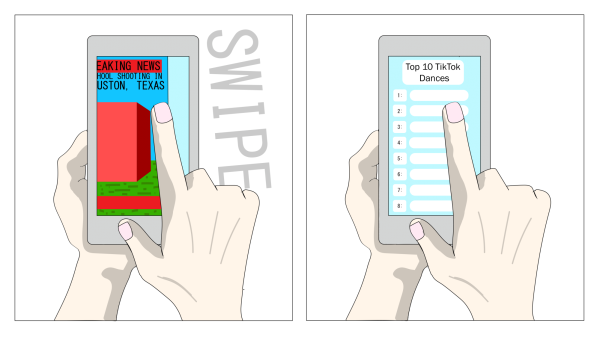College Board’s timed testing induces student suffering

photo by College Board
Pencils scribble across papers throughout the classroom as students rush from one question to the next in a frantic attempt to keep pace with the ticking clock.
Throughout education, drastic changes have been made to accommodate those with different needs. While other testing corporations have matched education as a whole, making great strides to offer accommodations to those with disabilities, College Board refuses to budge on their primitive, timed testing.
How are those with disabilities such as Attention Deficit Disorder or Attention Deficit Hyperactivity Disorder supposed to be able to function on a timed tests like the Scholastic Aptitude Tests or the Advanced Placement Exams? Those that suffer from ADD and ADHD often times get distracted or confused when they are reading passages or questions.
What about those with low reading comprehension or processing? They are certainly able to read the passages and questions, but they have trouble remembering and understanding what they read. This does not include the plethora of lesser known disabilities that plague students.
College Board certainly claims to offer accommodations for those who suffer from disabilities, but to acquire extended time, the student has to jump through too many hoops, including documenting their educational history, previous scores from both timed and untimed tests and occupational therapy evaluation. Students with low processing speeds have no hope of gaining extended time because, according to the College Board website, “a low processing speed in itself…does not usually indicate the need for testing accommodations.”
State testing for exams like the Florida Scholastic Assessment show the progressive steps made in making test more user friendly for those with disabilities. The state offers easy applications for those in need of accommodations. Students simply have to fill out paperwork and meet with a couple officials to gain necessary help through extra time.
Students get nervous about taking tests. Something not so well known is the stress that the time limits pile on top of this. These raised stress levels diminish students’ concentration as their thoughts begin to race around, distracting them from the questions in front of them and chipping away their time.
Recent studies with new brain imaging technology at Stanford University have shown that when students are put under stress to complete math problems within time limits, they are unable to correctly complete the questions due to stress and its impact on their memory.
Current education standards place substantial emphasis on critical thinking. Critical thinking involves analyzing and reflecting on the given information as well as what was learned within the course. The considerable amount of work that needs to be completed to answer these questions takes more than simply regurgitating the information that students have learned over the year. Critical thinking requires time for the students to accurately answer. College Board has added critical thinking questions within their tests, but they have not added additional time to allow students to answer the more extensive questions. This leaves students with the only option of skipping the more expansive questions to be able to answer and earn the points from the easy questions within their limited time.
Keeping time limits around is understandable, but surely there has to be a way to finish a test within a reasonable amount of time. Having a flat rate of time for a whole test is understandable, but, at the end of that time, College Board can stop with their stingy restrictions on extended time. Instead of restricting extra time to diagnosed and approved students, they can allow their current amount of up to 150 percent of extra to time to all who need to utilize it. This still allows students to leave as they finish their tests without feeling pressured.
College Board’s exams can deeply affect a student’s life, starting with what classes they will take the following year and going as far as to dictate what college they go to. Restricting the time for such important tests prohibits students from being able to show their full potential and, after all the time they have spent preparing for these tests, students should have enough time to complete it to the maximum of their abilities.
Your donation will support the student journalists of Hagerty High School. We are an ad-free publication, and your contribution helps us publish six issues of the BluePrint and cover our annual website hosting costs. Thank you so much!






